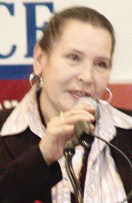
Avis Little Eagle. Photo Amanda Takes War Bonnett.
RAPID CITY, SOUTH DAKOTA -- For Native American veterans, closing down the VA Hospital at Hot Springs could bring many hardships. The proposed changes to the Veterans Affairs Black Hills Health Care System, while at first glance make sense fiscally and sounds good on paper, they fail to address the actual hardships that veterans in the South Western South Dakota and North Eastern Nebraska will experience. This includes the thousands of Native American veterans who have had difficulty accessing the adequate physical and mental health care they deserve. Oglala Sioux Tribe’s 5th Member of the Executive Committee, Myron Pourier, said, “Currently our Tribal Veterans lack of financial support due to the 75 to 80% unemployment on the Pine Ridge Indian Reservation , many of our Tribal Veterans are plagued with Post Traumatic Stress Disorder and other Service Connected Disabilities.” Currently the reservation veterans have to travel more than 60 miles to Hot Springs where the nearest VA Hospital is located. The changes will increase that distance by up 200 miles for many of the veterans coming from the Pine Ridge and Rosebud Indian Reservations, not to mention the hundreds who live in the Panhandle of Nebraska. There have been recent Town Hall style meetings with three of the VA administrators, including Janet Murphy, Network Director for the VA Midwest Health Care Network, Veterans Integrated Service Network , VISN,23 in Minneapolis, MN; Steven C. Julius, MD, who was appointed CISN 23 Chief Medical Officer; and Stephen R. DiStasio, Acting Director of VA Black Hills Health Care System. One of the changes proposed is the closure of the Hot Springs Domiciliary. According the presentation provided by the VA, the purpose of this closure is purported to shift inpatient demand to a “more robust care environment: purchase care at Fall River Hospital in Hot Springs and other local hospitals in South Dakota and Nebraska.” Another reason given for the closure is to replace the Domiciliary and enhance its service. The building of a state of the art facility in which to optimize treatment and opportunity is proposed with the result anticipated being more services for homeless and women veterans as well as more post treatment job opportunities and access to social services. Several meetings were held in the area due to be impacted by the proposed changes, including Hot Springs, Rapid City, Pine Ridge, Pierre, Eagle Butte, Gordon, Neb, and Scottsbluff, Neb. According to the proposed timeline, the team presenting the proposed changes will report back the VA Central office the feedback gathered from stockholders between December 2011 and January 2012 by February 2012. The approval of the new Domiciliary Build is pending at this point. Transferring inpatient/nursing home/ urgent care services currently provided in Hot Springs to Fall River Hospitals and other facilities is estimated to take one to two years. All told, the entire proposal should wind up in five years. One of the major concerns, outside of the extended distance for health care, is the impact that the closure in Hot Springs will have on the city. According to the proposal presented, no Reduction In Force, RIF, are anticipated, but offers for early retirements/separations with buy-out support will be available with Office of Personnel Management approval. With 1060 current VA Black Hills HCS employees, it is estimated that that number will be reduced by 325 by the year 2020. Considering the history that the domiciliary has in Hot Springs, as well as being a major, although not largest, employer in the city, the VA stressed their understanding of the impact on the Hot Springs Community. The VA offers its partnership with the community seek out repurposing opportunities for the Hot Springs Campus. Many veterans like James W. Garnette spent many months at the Domiciliary at Hot Springs. “It was closer to home and it allowed my friends and family to visit me much more regularly than if I had been further away,” he said. Garnette added that the facilities were the best in the Nation and the care he was given has allowed him to lead a productive life outside of the hospital. Former President of the Oglala Sioux Tribe, Enos Poor Bear, spent his last days on this earth at the Domiciliary at Hot Springs. During his final days he had many visitors such as Tim Giago and Avis Little Eagle from Indian Country Today newspaper, visit with him and share his final thoughts. (Contact Karin Eagle at staffwriter2@nsweekly.com)
Join the Conversation
